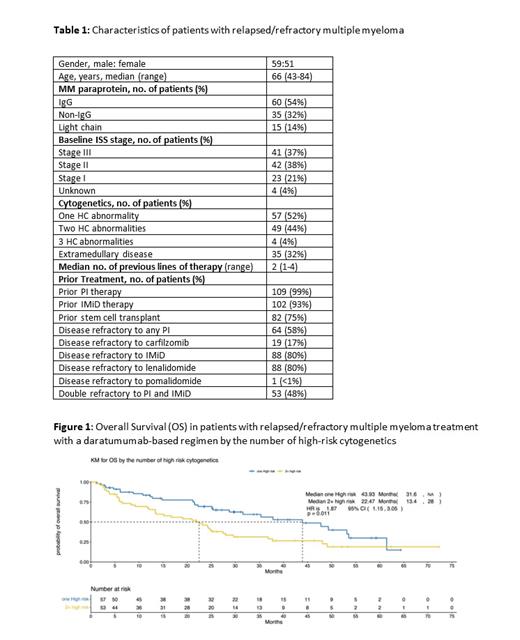Background: Daratumumab-based combination with proteasome inhibitors (PI) and immunomodulatory drugs (IMiDs) have revolutionized the treatment outcomes of relapsed/refractory multiple myeloma (RRMM). Several daratumumab-based triplet combinations have been approved for the management of RRMM, but outcomes of daratumumab-based triplets in patients with high-risk cytogenetics RRMM (HC-RRMM) are not well described in the literature. This study aimed to evaluate the clinical outcome of daratumumab-based regimens in patients with HC-RRMM who are daratumumab-naïve.
Methods: A retrospective review of 110 patients with HC-RRMM who received daratumumab-containing regimens from 6/2016 through 2/2023 at the University of Kansas Medical Center, in collaboration with the U.S Myeloma Innovations Research Collaborative (USMIRC) was conducted. Daratumumab was combined with bortezomib/dexamethasone (DVd), carfilzomib/dexamethasone (DKd), and pomalidomide/dexamethasone (DPd) for treatment of RRMM. HC-RRMM was defined as patients with one or more cytogenetic abnormalities (on FISH panel) including -17/del(17p), t(4;14), t(14;16), t(14;20), or amplification of 1q. Responses to therapy including overall response rate (ORR), complete response or better (≥CR), and very good partial response (VGPR) were evaluated using the International Myeloma Working Group (IMWG) criteria. Descriptive statistics were used to summarize patient and disease characteristics, along with efficacy outcomes. Progression-free survival (PFS) and overall survival (OS) were calculated by Kaplan-Meier methods.
Results: Of the 110 patients with HC-RRMM, the median age was 66 years (range 43-84), 83 (75%) were Caucasian, 60 (54%) had IgG isotype, 41 (37%) had revised international staging system (R-ISS) stage III disease, 35 (32%) had extramedullary disease (EMD), 57 (52%) patients had one high-risk cytogenetic (HC) abnormality, 49 (44%) had 2 HC abnormalities, while four (4%) had 3 HC abnormalities. The median number of previous lines of therapy was 2 (1-4). Eighty-eight patients (80%) were lenalidomide refractory, while 53 patients (48%) had double refractory disease to both a PI and IMiD treatment. A total of 19 (17%), 27 (25%), and 64 (58%) patients received DVd, DKd, and DPd, respectively.
The overall response rate (ORR) for the entire patient population was 73%, 45% had VGPR or better, and 35% achieved ≥CR. Median follow-up was 28 months (12.07-53.57), the median OS was 28 months (95% CI 23.2 - 43.9) and PFS was 8.03 months (95% CI 5.8 - 12.2) for all treatment groups. The median PFS for 1 HC vs ³ 2 HC was 14.8 vs 4.57 months (HR 1.72, 95%CI 1.17-2.72 p = 0.006), respectively. Similarly, median OS for 1 HC vs ³ 2 HC was 43.93 vs 22.47 months (HR 1.87, 95%CI 1.15-3.05, p = 0.011), respectively. (Figure 1). On multivariate analysis, R-ISS stage III, -17/del(17p), and the presence of more than one HC abnormality were associated with poor OS.
The most common cause for treatment discontinuation was progressive disease, accounting for 73% of patients in the whole cohort. As for each daratumumab-based triplet, discontinuation due progression occurred in 78%, 48%, and 83% in DVd, DKd, and DPd, respectively. Other causes of discontinuation included > grade 3 neuropathy, which occurred in 16% of patients receiving DVd, and cardiac events, which occurred in 11% of patients receiving DKd. Treatment-related mortality occurred in 2% of patients in the whole cohort. At the time of evaluation, 14 patients remain on treatment.
Conclusion: Advanced stage R-ISS disease at diagnosis, presence of -17/del(17p), and 2 or more HC abnormalities were associated with poor prognosis reflected by worse PFS and OS in HC-RRMM treated with daratumumab-based therapies. A larger cohort or a prospective study in patients with HC-RRMM is needed to compare long-term outcomes between daratumumab-based therapies (DKd, DVd, and DPd).
Disclosures
Hashmi:Jannsen: Honoraria, Speakers Bureau; BMS: Honoraria; Karyopharm: Speakers Bureau; Sanofi: Honoraria, Speakers Bureau; GSK: Honoraria, Speakers Bureau. Paul:Janssen: Membership on an entity's Board of Directors or advisory committees. Ahmed:BMS: Other: Ad Board; Kite/Gilead: Consultancy, Research Funding.


This feature is available to Subscribers Only
Sign In or Create an Account Close Modal